An Analysis of Responsible Leadership Practices: MGT808 Report
VerifiedAdded on 2022/12/15
|13
|3109
|431
Report
AI Summary
This report presents an analysis of an interview conducted with a business leader to explore their perspectives on responsible leadership. The report delves into the essential tasks, skills, and traits of a responsible leader, emphasizing the importance of fostering a productive and committed organizational culture. The analysis highlights the leader's approach to developing a culture of responsibility and ensuring employee involvement in decision-making. Furthermore, the report examines the leader's responsibilities within a stakeholder society, emphasizing the significance of building and maintaining trustful relationships with all stakeholders. The findings indicate the need for integrating corporate social responsibility and leadership ethics for sustainable business and stakeholder relationships. The report concludes with a summary of the key findings and recommendations for practicing responsible leadership within organizations.
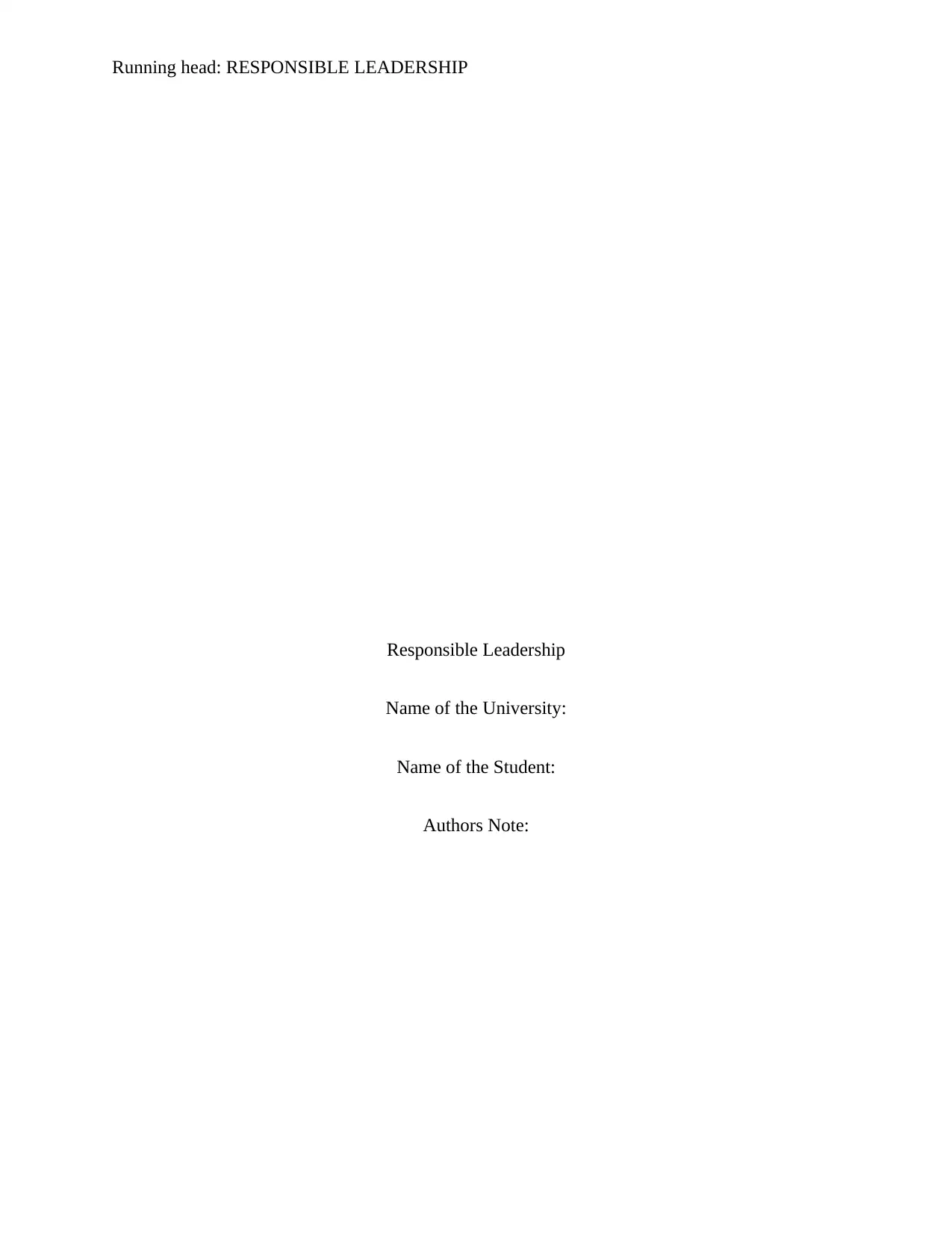
Running head: RESPONSIBLE LEADERSHIP
Responsible Leadership
Name of the University:
Name of the Student:
Authors Note:
Responsible Leadership
Name of the University:
Name of the Student:
Authors Note:
Paraphrase This Document
Need a fresh take? Get an instant paraphrase of this document with our AI Paraphraser
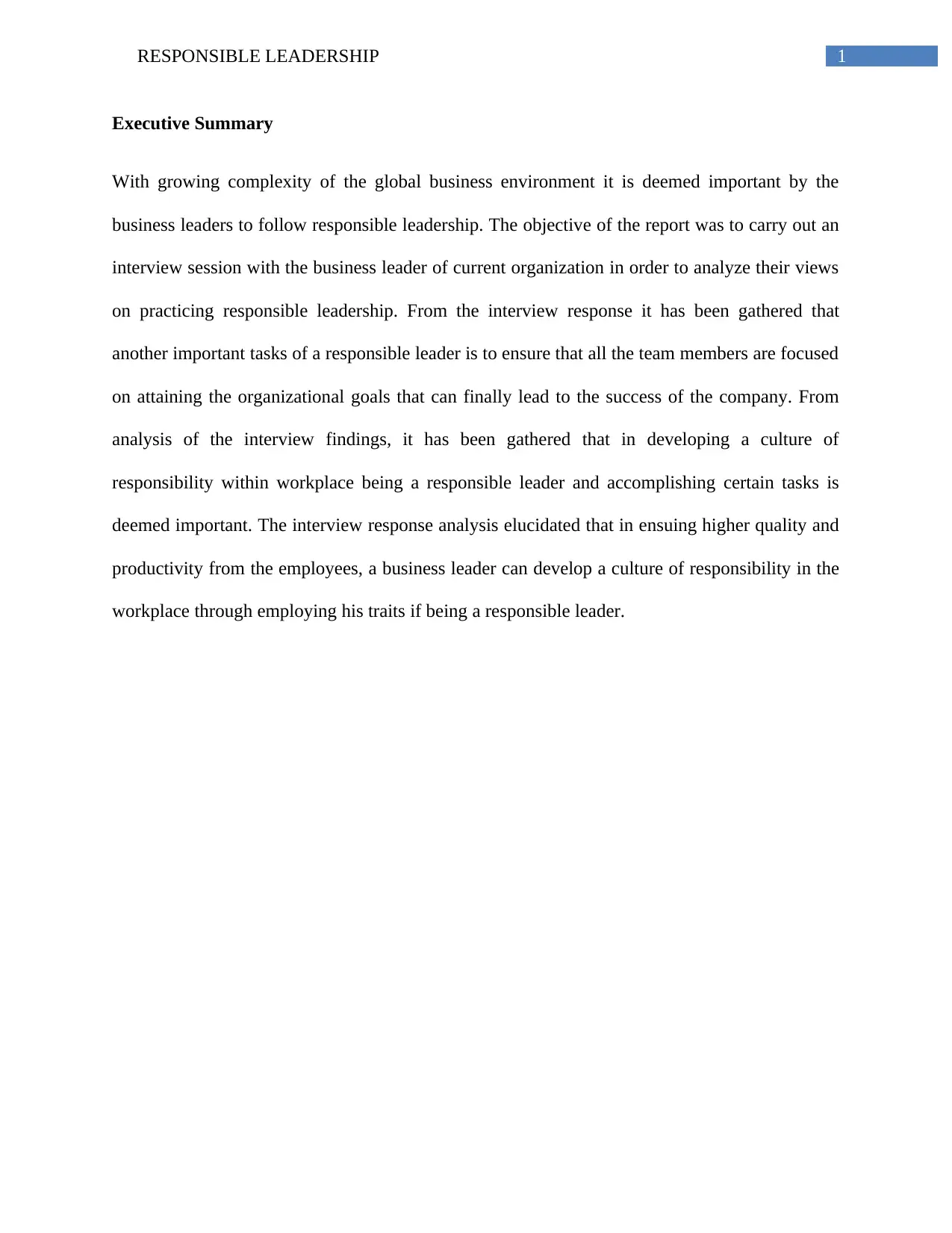
1RESPONSIBLE LEADERSHIP
Executive Summary
With growing complexity of the global business environment it is deemed important by the
business leaders to follow responsible leadership. The objective of the report was to carry out an
interview session with the business leader of current organization in order to analyze their views
on practicing responsible leadership. From the interview response it has been gathered that
another important tasks of a responsible leader is to ensure that all the team members are focused
on attaining the organizational goals that can finally lead to the success of the company. From
analysis of the interview findings, it has been gathered that in developing a culture of
responsibility within workplace being a responsible leader and accomplishing certain tasks is
deemed important. The interview response analysis elucidated that in ensuing higher quality and
productivity from the employees, a business leader can develop a culture of responsibility in the
workplace through employing his traits if being a responsible leader.
Executive Summary
With growing complexity of the global business environment it is deemed important by the
business leaders to follow responsible leadership. The objective of the report was to carry out an
interview session with the business leader of current organization in order to analyze their views
on practicing responsible leadership. From the interview response it has been gathered that
another important tasks of a responsible leader is to ensure that all the team members are focused
on attaining the organizational goals that can finally lead to the success of the company. From
analysis of the interview findings, it has been gathered that in developing a culture of
responsibility within workplace being a responsible leader and accomplishing certain tasks is
deemed important. The interview response analysis elucidated that in ensuing higher quality and
productivity from the employees, a business leader can develop a culture of responsibility in the
workplace through employing his traits if being a responsible leader.
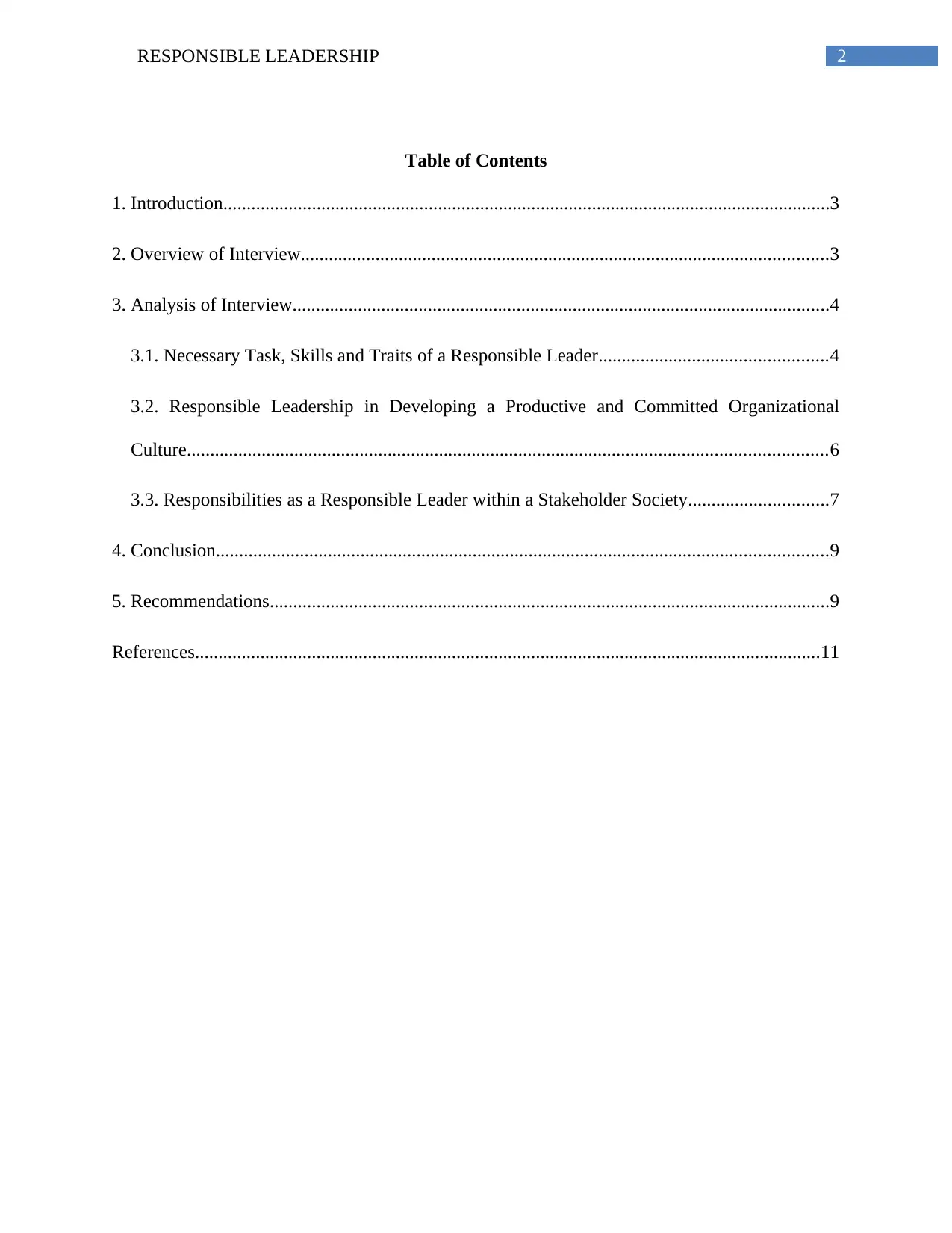
2RESPONSIBLE LEADERSHIP
Table of Contents
1. Introduction..................................................................................................................................3
2. Overview of Interview.................................................................................................................3
3. Analysis of Interview...................................................................................................................4
3.1. Necessary Task, Skills and Traits of a Responsible Leader.................................................4
3.2. Responsible Leadership in Developing a Productive and Committed Organizational
Culture.........................................................................................................................................6
3.3. Responsibilities as a Responsible Leader within a Stakeholder Society..............................7
4. Conclusion...................................................................................................................................9
5. Recommendations........................................................................................................................9
References......................................................................................................................................11
Table of Contents
1. Introduction..................................................................................................................................3
2. Overview of Interview.................................................................................................................3
3. Analysis of Interview...................................................................................................................4
3.1. Necessary Task, Skills and Traits of a Responsible Leader.................................................4
3.2. Responsible Leadership in Developing a Productive and Committed Organizational
Culture.........................................................................................................................................6
3.3. Responsibilities as a Responsible Leader within a Stakeholder Society..............................7
4. Conclusion...................................................................................................................................9
5. Recommendations........................................................................................................................9
References......................................................................................................................................11
⊘ This is a preview!⊘
Do you want full access?
Subscribe today to unlock all pages.

Trusted by 1+ million students worldwide
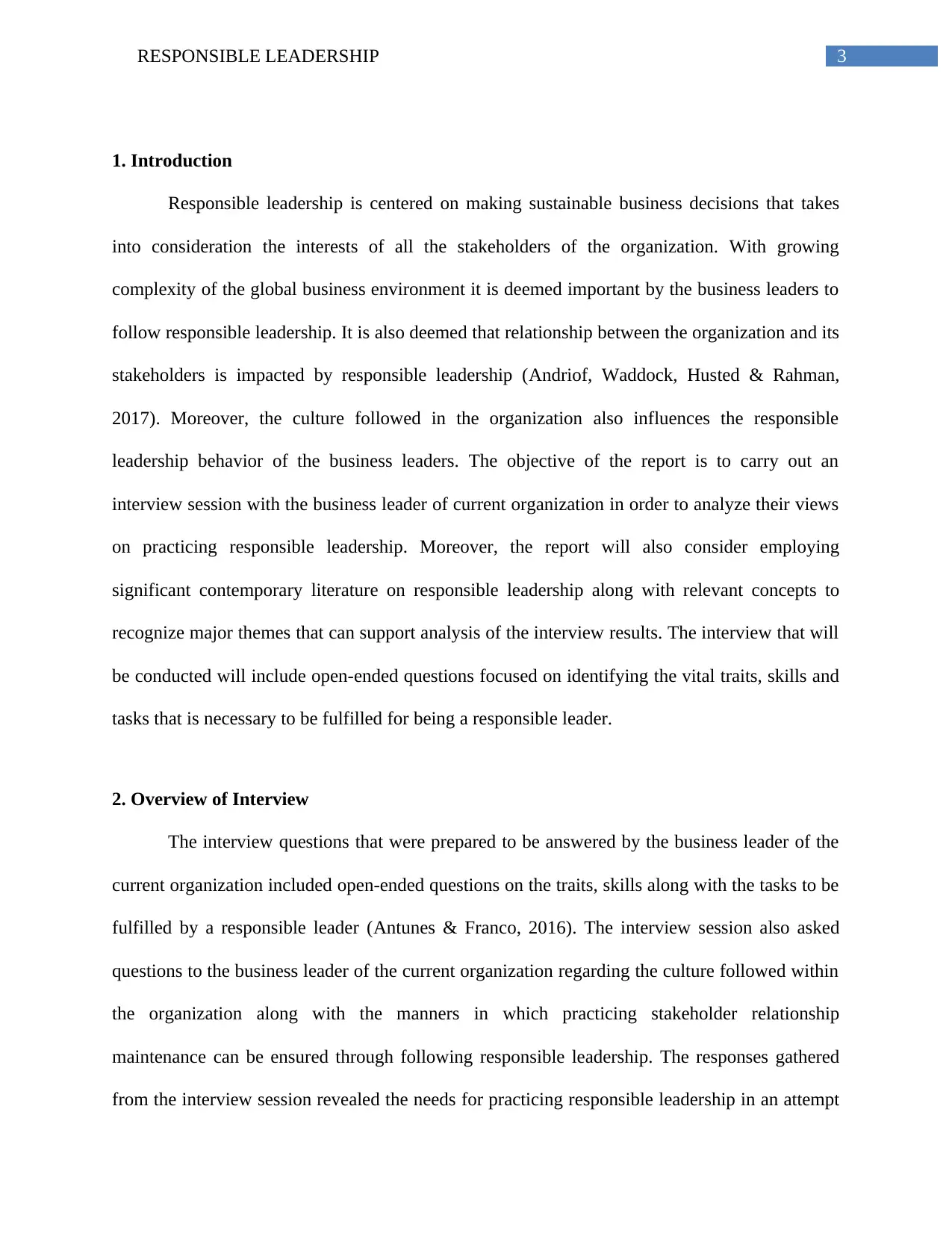
3RESPONSIBLE LEADERSHIP
1. Introduction
Responsible leadership is centered on making sustainable business decisions that takes
into consideration the interests of all the stakeholders of the organization. With growing
complexity of the global business environment it is deemed important by the business leaders to
follow responsible leadership. It is also deemed that relationship between the organization and its
stakeholders is impacted by responsible leadership (Andriof, Waddock, Husted & Rahman,
2017). Moreover, the culture followed in the organization also influences the responsible
leadership behavior of the business leaders. The objective of the report is to carry out an
interview session with the business leader of current organization in order to analyze their views
on practicing responsible leadership. Moreover, the report will also consider employing
significant contemporary literature on responsible leadership along with relevant concepts to
recognize major themes that can support analysis of the interview results. The interview that will
be conducted will include open-ended questions focused on identifying the vital traits, skills and
tasks that is necessary to be fulfilled for being a responsible leader.
2. Overview of Interview
The interview questions that were prepared to be answered by the business leader of the
current organization included open-ended questions on the traits, skills along with the tasks to be
fulfilled by a responsible leader (Antunes & Franco, 2016). The interview session also asked
questions to the business leader of the current organization regarding the culture followed within
the organization along with the manners in which practicing stakeholder relationship
maintenance can be ensured through following responsible leadership. The responses gathered
from the interview session revealed the needs for practicing responsible leadership in an attempt
1. Introduction
Responsible leadership is centered on making sustainable business decisions that takes
into consideration the interests of all the stakeholders of the organization. With growing
complexity of the global business environment it is deemed important by the business leaders to
follow responsible leadership. It is also deemed that relationship between the organization and its
stakeholders is impacted by responsible leadership (Andriof, Waddock, Husted & Rahman,
2017). Moreover, the culture followed in the organization also influences the responsible
leadership behavior of the business leaders. The objective of the report is to carry out an
interview session with the business leader of current organization in order to analyze their views
on practicing responsible leadership. Moreover, the report will also consider employing
significant contemporary literature on responsible leadership along with relevant concepts to
recognize major themes that can support analysis of the interview results. The interview that will
be conducted will include open-ended questions focused on identifying the vital traits, skills and
tasks that is necessary to be fulfilled for being a responsible leader.
2. Overview of Interview
The interview questions that were prepared to be answered by the business leader of the
current organization included open-ended questions on the traits, skills along with the tasks to be
fulfilled by a responsible leader (Antunes & Franco, 2016). The interview session also asked
questions to the business leader of the current organization regarding the culture followed within
the organization along with the manners in which practicing stakeholder relationship
maintenance can be ensured through following responsible leadership. The responses gathered
from the interview session revealed the needs for practicing responsible leadership in an attempt
Paraphrase This Document
Need a fresh take? Get an instant paraphrase of this document with our AI Paraphraser
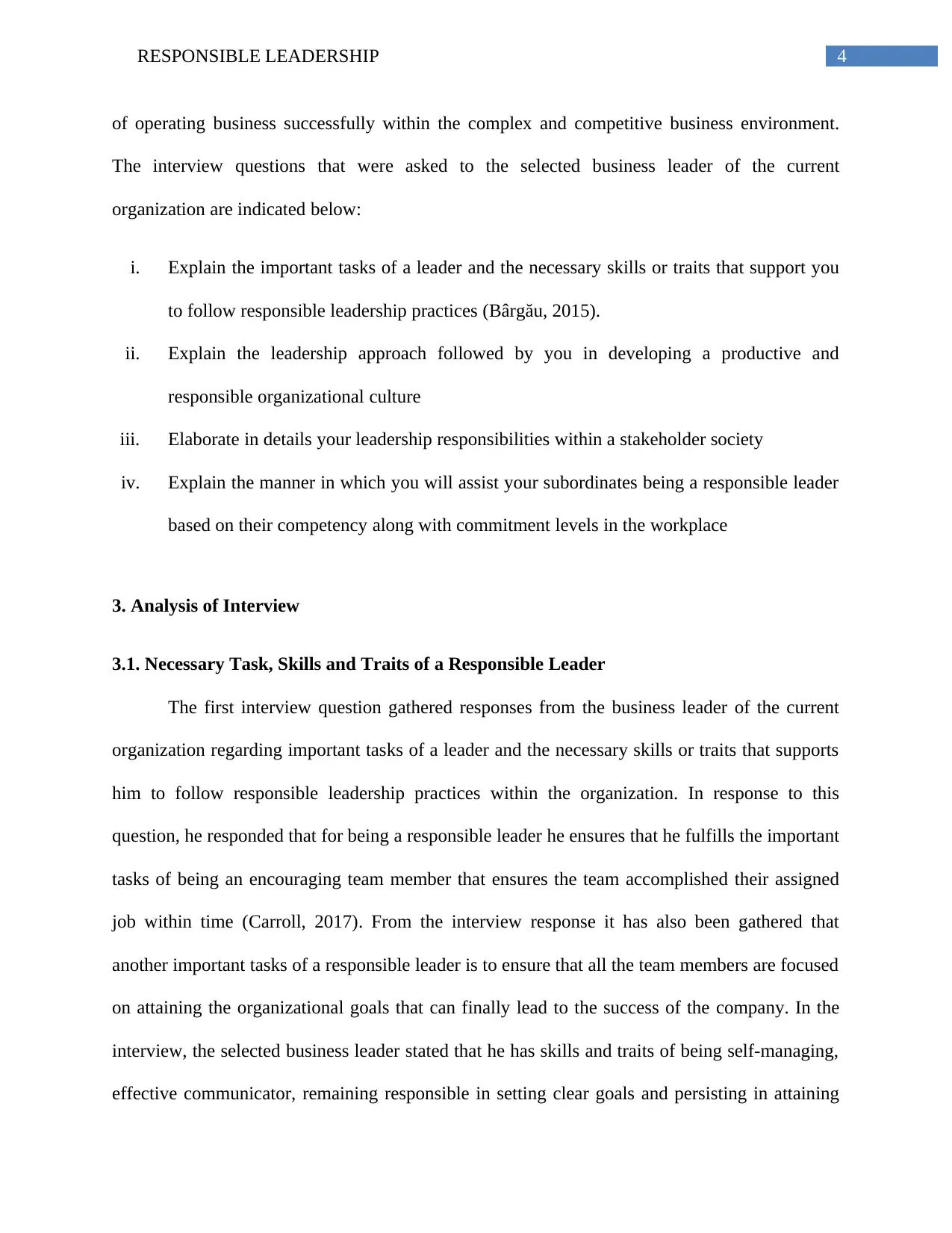
4RESPONSIBLE LEADERSHIP
of operating business successfully within the complex and competitive business environment.
The interview questions that were asked to the selected business leader of the current
organization are indicated below:
i. Explain the important tasks of a leader and the necessary skills or traits that support you
to follow responsible leadership practices (Bârgău, 2015).
ii. Explain the leadership approach followed by you in developing a productive and
responsible organizational culture
iii. Elaborate in details your leadership responsibilities within a stakeholder society
iv. Explain the manner in which you will assist your subordinates being a responsible leader
based on their competency along with commitment levels in the workplace
3. Analysis of Interview
3.1. Necessary Task, Skills and Traits of a Responsible Leader
The first interview question gathered responses from the business leader of the current
organization regarding important tasks of a leader and the necessary skills or traits that supports
him to follow responsible leadership practices within the organization. In response to this
question, he responded that for being a responsible leader he ensures that he fulfills the important
tasks of being an encouraging team member that ensures the team accomplished their assigned
job within time (Carroll, 2017). From the interview response it has also been gathered that
another important tasks of a responsible leader is to ensure that all the team members are focused
on attaining the organizational goals that can finally lead to the success of the company. In the
interview, the selected business leader stated that he has skills and traits of being self-managing,
effective communicator, remaining responsible in setting clear goals and persisting in attaining
of operating business successfully within the complex and competitive business environment.
The interview questions that were asked to the selected business leader of the current
organization are indicated below:
i. Explain the important tasks of a leader and the necessary skills or traits that support you
to follow responsible leadership practices (Bârgău, 2015).
ii. Explain the leadership approach followed by you in developing a productive and
responsible organizational culture
iii. Elaborate in details your leadership responsibilities within a stakeholder society
iv. Explain the manner in which you will assist your subordinates being a responsible leader
based on their competency along with commitment levels in the workplace
3. Analysis of Interview
3.1. Necessary Task, Skills and Traits of a Responsible Leader
The first interview question gathered responses from the business leader of the current
organization regarding important tasks of a leader and the necessary skills or traits that supports
him to follow responsible leadership practices within the organization. In response to this
question, he responded that for being a responsible leader he ensures that he fulfills the important
tasks of being an encouraging team member that ensures the team accomplished their assigned
job within time (Carroll, 2017). From the interview response it has also been gathered that
another important tasks of a responsible leader is to ensure that all the team members are focused
on attaining the organizational goals that can finally lead to the success of the company. In the
interview, the selected business leader stated that he has skills and traits of being self-managing,
effective communicator, remaining responsible in setting clear goals and persisting in attaining
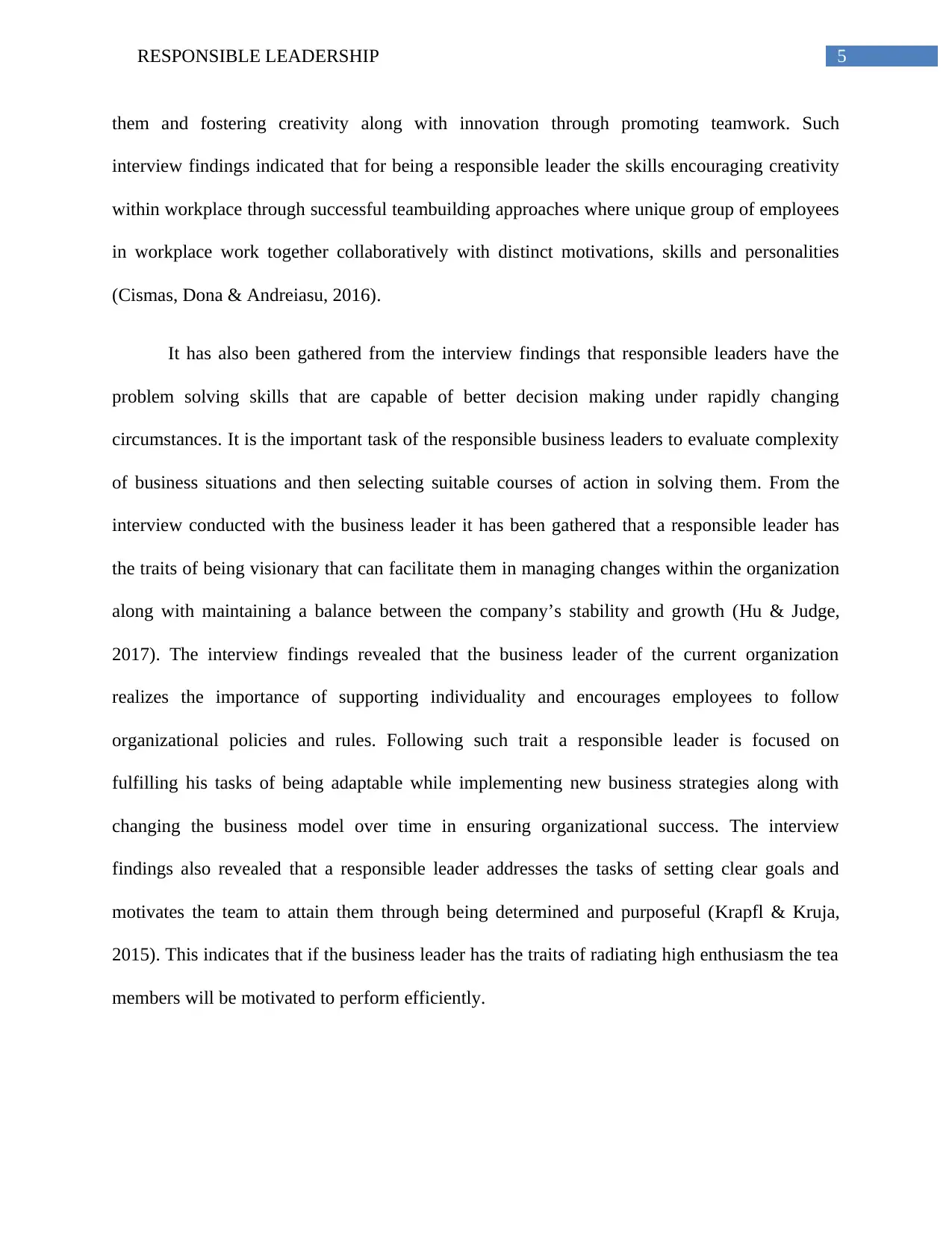
5RESPONSIBLE LEADERSHIP
them and fostering creativity along with innovation through promoting teamwork. Such
interview findings indicated that for being a responsible leader the skills encouraging creativity
within workplace through successful teambuilding approaches where unique group of employees
in workplace work together collaboratively with distinct motivations, skills and personalities
(Cismas, Dona & Andreiasu, 2016).
It has also been gathered from the interview findings that responsible leaders have the
problem solving skills that are capable of better decision making under rapidly changing
circumstances. It is the important task of the responsible business leaders to evaluate complexity
of business situations and then selecting suitable courses of action in solving them. From the
interview conducted with the business leader it has been gathered that a responsible leader has
the traits of being visionary that can facilitate them in managing changes within the organization
along with maintaining a balance between the company’s stability and growth (Hu & Judge,
2017). The interview findings revealed that the business leader of the current organization
realizes the importance of supporting individuality and encourages employees to follow
organizational policies and rules. Following such trait a responsible leader is focused on
fulfilling his tasks of being adaptable while implementing new business strategies along with
changing the business model over time in ensuring organizational success. The interview
findings also revealed that a responsible leader addresses the tasks of setting clear goals and
motivates the team to attain them through being determined and purposeful (Krapfl & Kruja,
2015). This indicates that if the business leader has the traits of radiating high enthusiasm the tea
members will be motivated to perform efficiently.
them and fostering creativity along with innovation through promoting teamwork. Such
interview findings indicated that for being a responsible leader the skills encouraging creativity
within workplace through successful teambuilding approaches where unique group of employees
in workplace work together collaboratively with distinct motivations, skills and personalities
(Cismas, Dona & Andreiasu, 2016).
It has also been gathered from the interview findings that responsible leaders have the
problem solving skills that are capable of better decision making under rapidly changing
circumstances. It is the important task of the responsible business leaders to evaluate complexity
of business situations and then selecting suitable courses of action in solving them. From the
interview conducted with the business leader it has been gathered that a responsible leader has
the traits of being visionary that can facilitate them in managing changes within the organization
along with maintaining a balance between the company’s stability and growth (Hu & Judge,
2017). The interview findings revealed that the business leader of the current organization
realizes the importance of supporting individuality and encourages employees to follow
organizational policies and rules. Following such trait a responsible leader is focused on
fulfilling his tasks of being adaptable while implementing new business strategies along with
changing the business model over time in ensuring organizational success. The interview
findings also revealed that a responsible leader addresses the tasks of setting clear goals and
motivates the team to attain them through being determined and purposeful (Krapfl & Kruja,
2015). This indicates that if the business leader has the traits of radiating high enthusiasm the tea
members will be motivated to perform efficiently.
⊘ This is a preview!⊘
Do you want full access?
Subscribe today to unlock all pages.

Trusted by 1+ million students worldwide
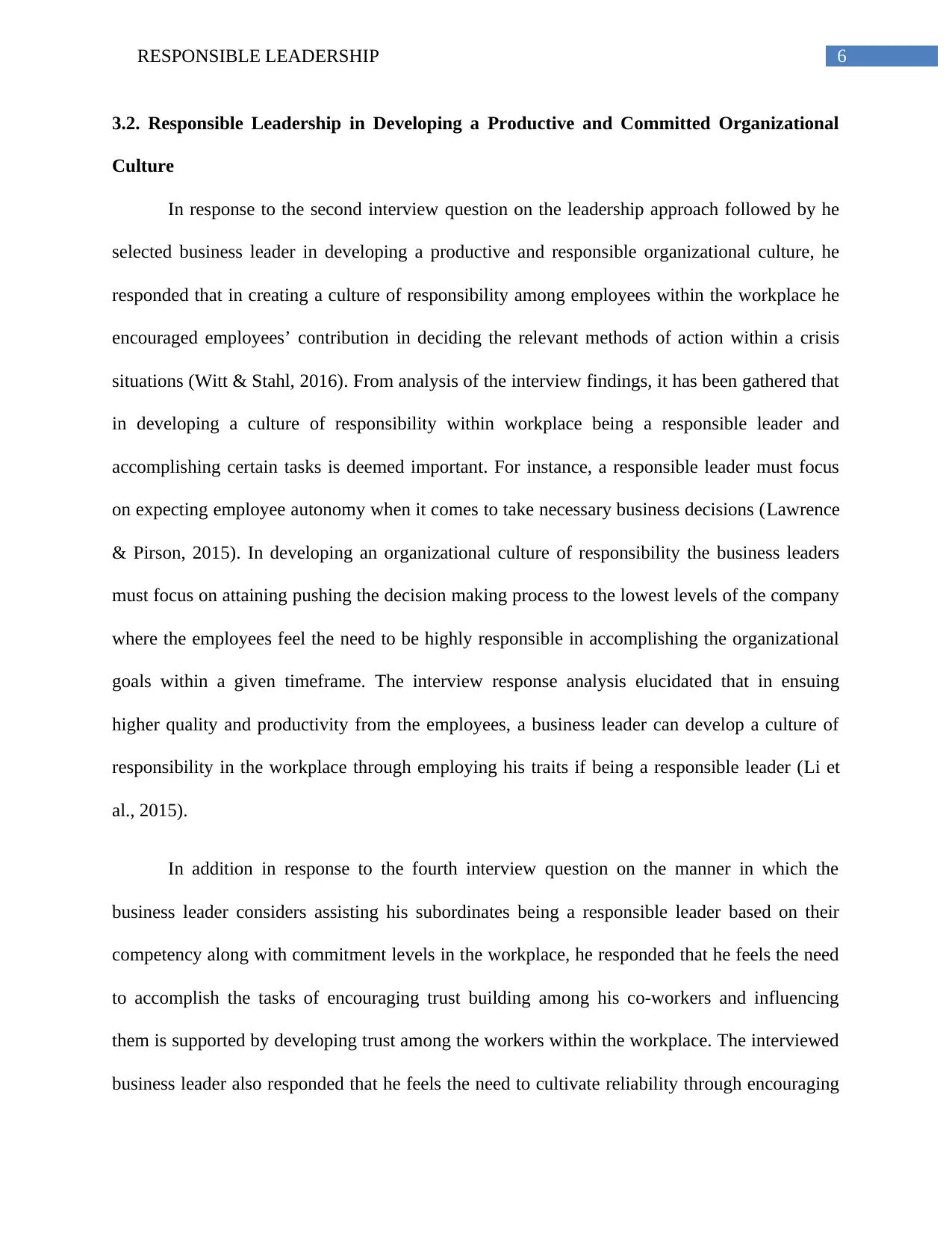
6RESPONSIBLE LEADERSHIP
3.2. Responsible Leadership in Developing a Productive and Committed Organizational
Culture
In response to the second interview question on the leadership approach followed by he
selected business leader in developing a productive and responsible organizational culture, he
responded that in creating a culture of responsibility among employees within the workplace he
encouraged employees’ contribution in deciding the relevant methods of action within a crisis
situations (Witt & Stahl, 2016). From analysis of the interview findings, it has been gathered that
in developing a culture of responsibility within workplace being a responsible leader and
accomplishing certain tasks is deemed important. For instance, a responsible leader must focus
on expecting employee autonomy when it comes to take necessary business decisions (Lawrence
& Pirson, 2015). In developing an organizational culture of responsibility the business leaders
must focus on attaining pushing the decision making process to the lowest levels of the company
where the employees feel the need to be highly responsible in accomplishing the organizational
goals within a given timeframe. The interview response analysis elucidated that in ensuing
higher quality and productivity from the employees, a business leader can develop a culture of
responsibility in the workplace through employing his traits if being a responsible leader (Li et
al., 2015).
In addition in response to the fourth interview question on the manner in which the
business leader considers assisting his subordinates being a responsible leader based on their
competency along with commitment levels in the workplace, he responded that he feels the need
to accomplish the tasks of encouraging trust building among his co-workers and influencing
them is supported by developing trust among the workers within the workplace. The interviewed
business leader also responded that he feels the need to cultivate reliability through encouraging
3.2. Responsible Leadership in Developing a Productive and Committed Organizational
Culture
In response to the second interview question on the leadership approach followed by he
selected business leader in developing a productive and responsible organizational culture, he
responded that in creating a culture of responsibility among employees within the workplace he
encouraged employees’ contribution in deciding the relevant methods of action within a crisis
situations (Witt & Stahl, 2016). From analysis of the interview findings, it has been gathered that
in developing a culture of responsibility within workplace being a responsible leader and
accomplishing certain tasks is deemed important. For instance, a responsible leader must focus
on expecting employee autonomy when it comes to take necessary business decisions (Lawrence
& Pirson, 2015). In developing an organizational culture of responsibility the business leaders
must focus on attaining pushing the decision making process to the lowest levels of the company
where the employees feel the need to be highly responsible in accomplishing the organizational
goals within a given timeframe. The interview response analysis elucidated that in ensuing
higher quality and productivity from the employees, a business leader can develop a culture of
responsibility in the workplace through employing his traits if being a responsible leader (Li et
al., 2015).
In addition in response to the fourth interview question on the manner in which the
business leader considers assisting his subordinates being a responsible leader based on their
competency along with commitment levels in the workplace, he responded that he feels the need
to accomplish the tasks of encouraging trust building among his co-workers and influencing
them is supported by developing trust among the workers within the workplace. The interviewed
business leader also responded that he feels the need to cultivate reliability through encouraging
Paraphrase This Document
Need a fresh take? Get an instant paraphrase of this document with our AI Paraphraser
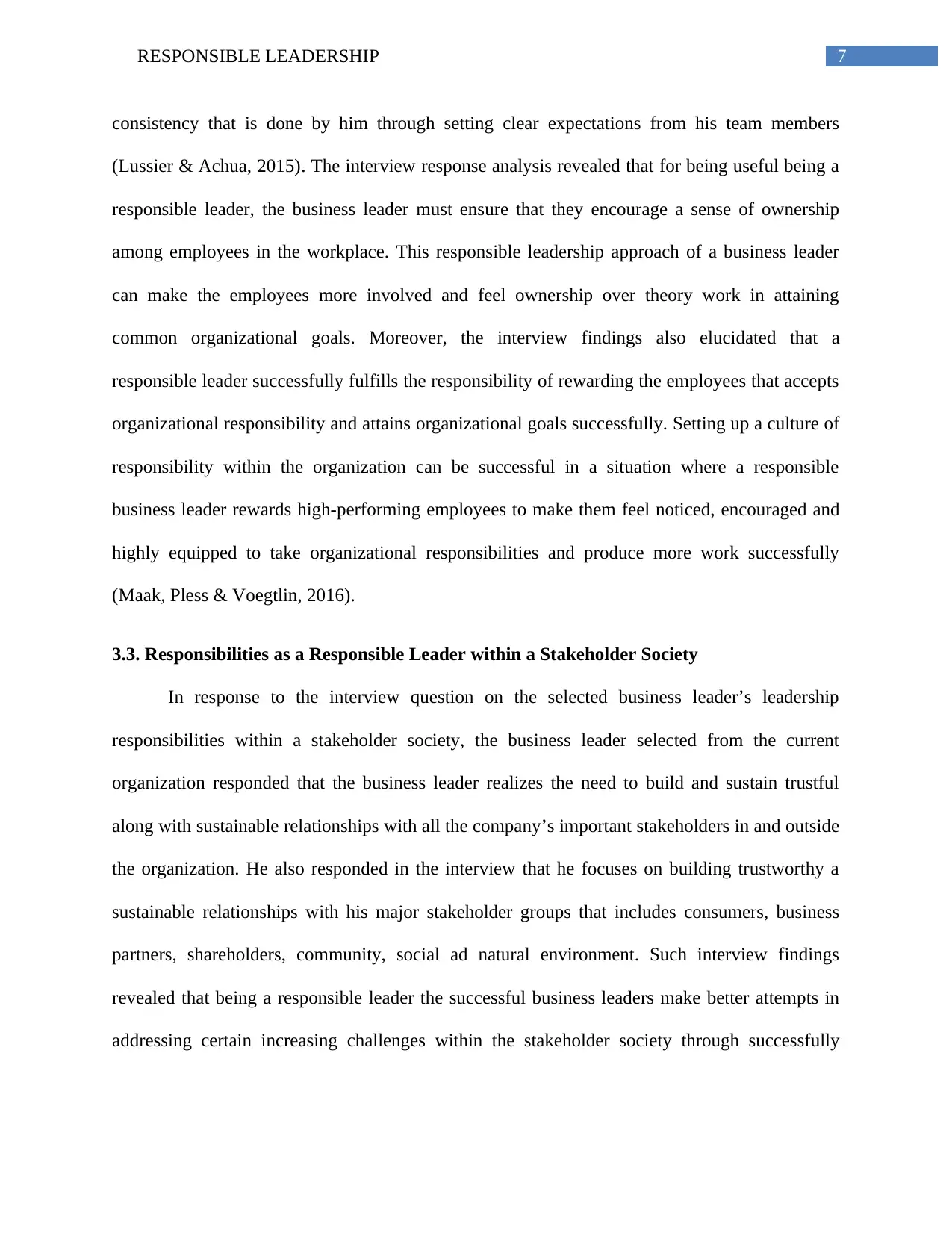
7RESPONSIBLE LEADERSHIP
consistency that is done by him through setting clear expectations from his team members
(Lussier & Achua, 2015). The interview response analysis revealed that for being useful being a
responsible leader, the business leader must ensure that they encourage a sense of ownership
among employees in the workplace. This responsible leadership approach of a business leader
can make the employees more involved and feel ownership over theory work in attaining
common organizational goals. Moreover, the interview findings also elucidated that a
responsible leader successfully fulfills the responsibility of rewarding the employees that accepts
organizational responsibility and attains organizational goals successfully. Setting up a culture of
responsibility within the organization can be successful in a situation where a responsible
business leader rewards high-performing employees to make them feel noticed, encouraged and
highly equipped to take organizational responsibilities and produce more work successfully
(Maak, Pless & Voegtlin, 2016).
3.3. Responsibilities as a Responsible Leader within a Stakeholder Society
In response to the interview question on the selected business leader’s leadership
responsibilities within a stakeholder society, the business leader selected from the current
organization responded that the business leader realizes the need to build and sustain trustful
along with sustainable relationships with all the company’s important stakeholders in and outside
the organization. He also responded in the interview that he focuses on building trustworthy a
sustainable relationships with his major stakeholder groups that includes consumers, business
partners, shareholders, community, social ad natural environment. Such interview findings
revealed that being a responsible leader the successful business leaders make better attempts in
addressing certain increasing challenges within the stakeholder society through successfully
consistency that is done by him through setting clear expectations from his team members
(Lussier & Achua, 2015). The interview response analysis revealed that for being useful being a
responsible leader, the business leader must ensure that they encourage a sense of ownership
among employees in the workplace. This responsible leadership approach of a business leader
can make the employees more involved and feel ownership over theory work in attaining
common organizational goals. Moreover, the interview findings also elucidated that a
responsible leader successfully fulfills the responsibility of rewarding the employees that accepts
organizational responsibility and attains organizational goals successfully. Setting up a culture of
responsibility within the organization can be successful in a situation where a responsible
business leader rewards high-performing employees to make them feel noticed, encouraged and
highly equipped to take organizational responsibilities and produce more work successfully
(Maak, Pless & Voegtlin, 2016).
3.3. Responsibilities as a Responsible Leader within a Stakeholder Society
In response to the interview question on the selected business leader’s leadership
responsibilities within a stakeholder society, the business leader selected from the current
organization responded that the business leader realizes the need to build and sustain trustful
along with sustainable relationships with all the company’s important stakeholders in and outside
the organization. He also responded in the interview that he focuses on building trustworthy a
sustainable relationships with his major stakeholder groups that includes consumers, business
partners, shareholders, community, social ad natural environment. Such interview findings
revealed that being a responsible leader the successful business leaders make better attempts in
addressing certain increasing challenges within the stakeholder society through successfully
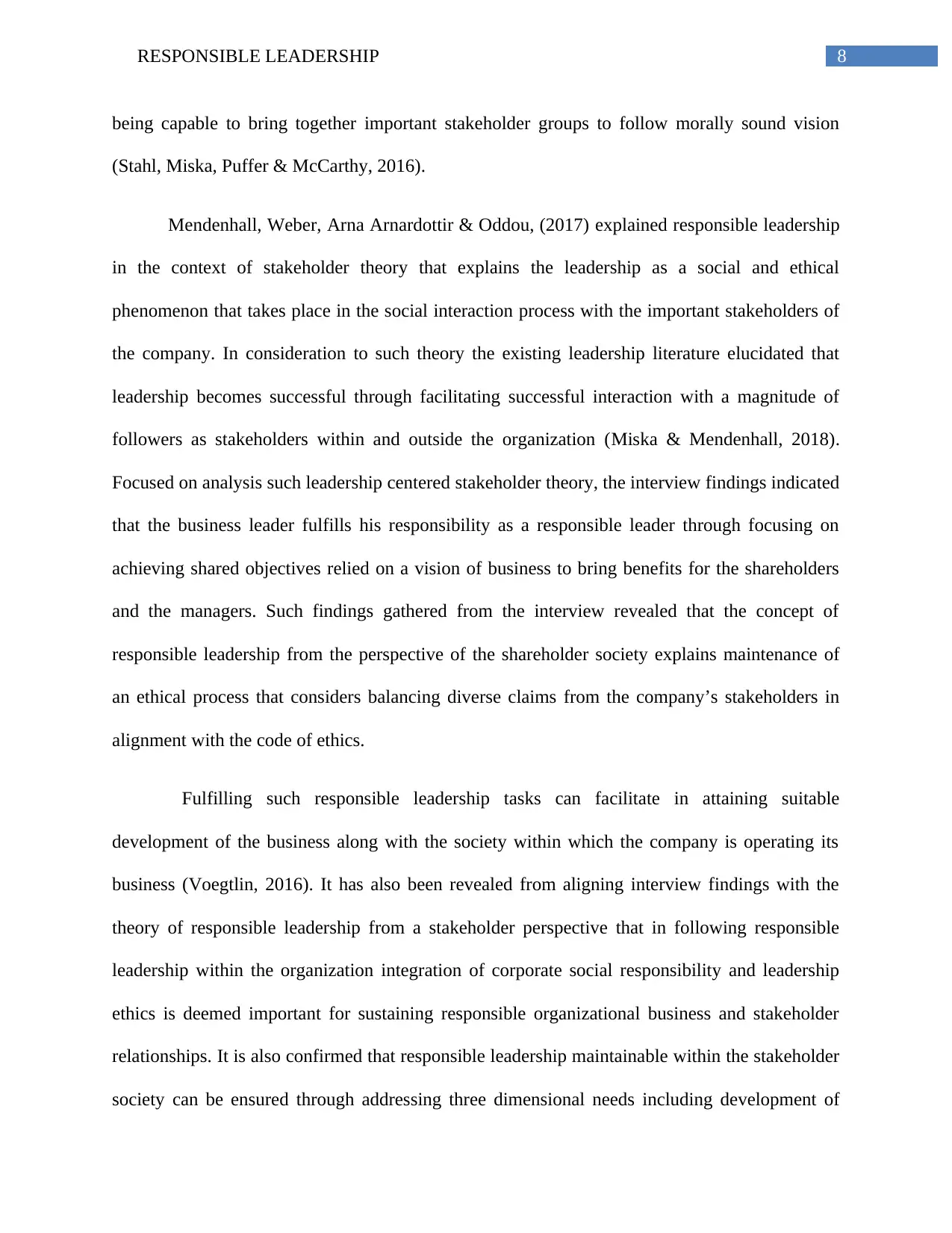
8RESPONSIBLE LEADERSHIP
being capable to bring together important stakeholder groups to follow morally sound vision
(Stahl, Miska, Puffer & McCarthy, 2016).
Mendenhall, Weber, Arna Arnardottir & Oddou, (2017) explained responsible leadership
in the context of stakeholder theory that explains the leadership as a social and ethical
phenomenon that takes place in the social interaction process with the important stakeholders of
the company. In consideration to such theory the existing leadership literature elucidated that
leadership becomes successful through facilitating successful interaction with a magnitude of
followers as stakeholders within and outside the organization (Miska & Mendenhall, 2018).
Focused on analysis such leadership centered stakeholder theory, the interview findings indicated
that the business leader fulfills his responsibility as a responsible leader through focusing on
achieving shared objectives relied on a vision of business to bring benefits for the shareholders
and the managers. Such findings gathered from the interview revealed that the concept of
responsible leadership from the perspective of the shareholder society explains maintenance of
an ethical process that considers balancing diverse claims from the company’s stakeholders in
alignment with the code of ethics.
Fulfilling such responsible leadership tasks can facilitate in attaining suitable
development of the business along with the society within which the company is operating its
business (Voegtlin, 2016). It has also been revealed from aligning interview findings with the
theory of responsible leadership from a stakeholder perspective that in following responsible
leadership within the organization integration of corporate social responsibility and leadership
ethics is deemed important for sustaining responsible organizational business and stakeholder
relationships. It is also confirmed that responsible leadership maintainable within the stakeholder
society can be ensured through addressing three dimensional needs including development of
being capable to bring together important stakeholder groups to follow morally sound vision
(Stahl, Miska, Puffer & McCarthy, 2016).
Mendenhall, Weber, Arna Arnardottir & Oddou, (2017) explained responsible leadership
in the context of stakeholder theory that explains the leadership as a social and ethical
phenomenon that takes place in the social interaction process with the important stakeholders of
the company. In consideration to such theory the existing leadership literature elucidated that
leadership becomes successful through facilitating successful interaction with a magnitude of
followers as stakeholders within and outside the organization (Miska & Mendenhall, 2018).
Focused on analysis such leadership centered stakeholder theory, the interview findings indicated
that the business leader fulfills his responsibility as a responsible leader through focusing on
achieving shared objectives relied on a vision of business to bring benefits for the shareholders
and the managers. Such findings gathered from the interview revealed that the concept of
responsible leadership from the perspective of the shareholder society explains maintenance of
an ethical process that considers balancing diverse claims from the company’s stakeholders in
alignment with the code of ethics.
Fulfilling such responsible leadership tasks can facilitate in attaining suitable
development of the business along with the society within which the company is operating its
business (Voegtlin, 2016). It has also been revealed from aligning interview findings with the
theory of responsible leadership from a stakeholder perspective that in following responsible
leadership within the organization integration of corporate social responsibility and leadership
ethics is deemed important for sustaining responsible organizational business and stakeholder
relationships. It is also confirmed that responsible leadership maintainable within the stakeholder
society can be ensured through addressing three dimensional needs including development of
⊘ This is a preview!⊘
Do you want full access?
Subscribe today to unlock all pages.

Trusted by 1+ million students worldwide
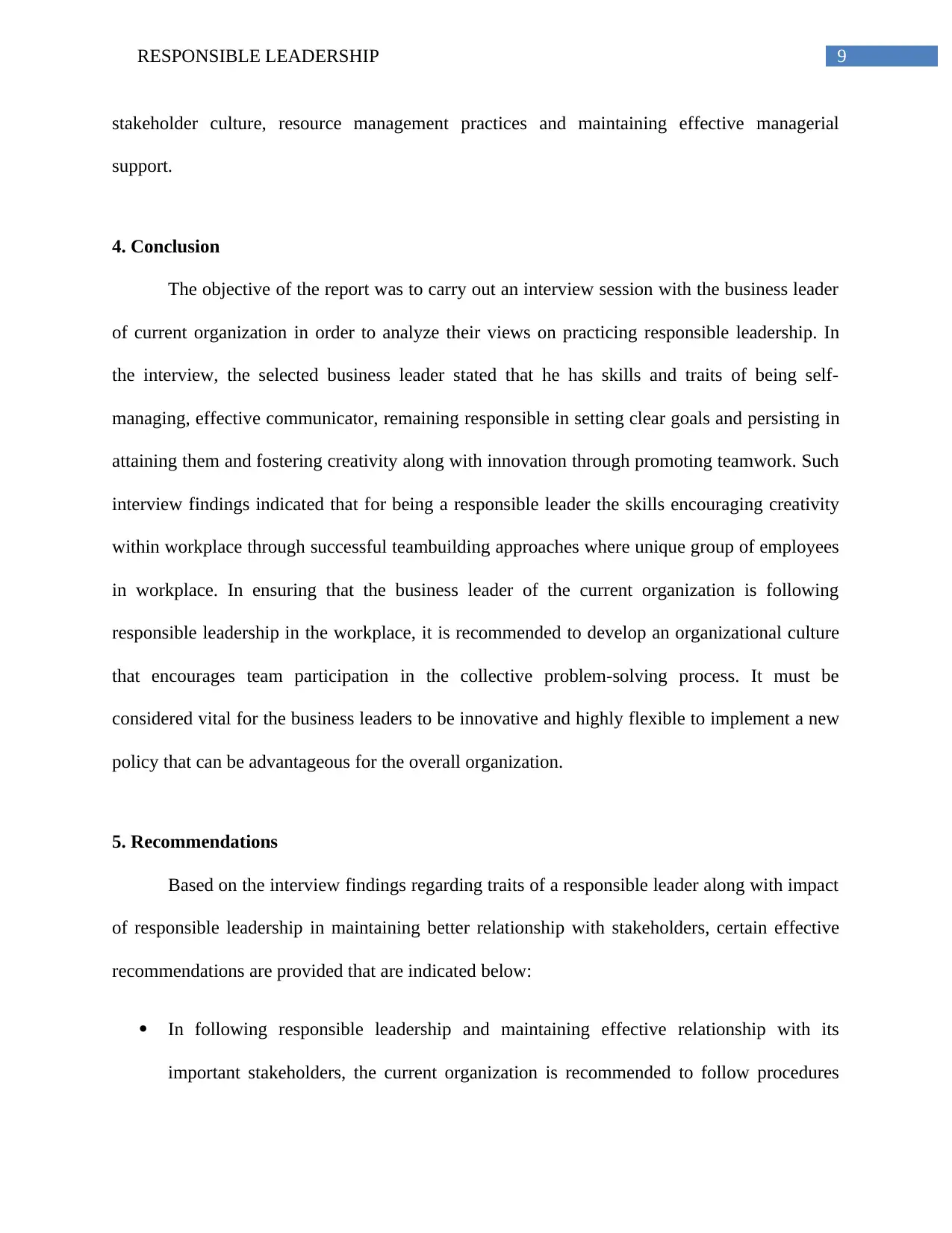
9RESPONSIBLE LEADERSHIP
stakeholder culture, resource management practices and maintaining effective managerial
support.
4. Conclusion
The objective of the report was to carry out an interview session with the business leader
of current organization in order to analyze their views on practicing responsible leadership. In
the interview, the selected business leader stated that he has skills and traits of being self-
managing, effective communicator, remaining responsible in setting clear goals and persisting in
attaining them and fostering creativity along with innovation through promoting teamwork. Such
interview findings indicated that for being a responsible leader the skills encouraging creativity
within workplace through successful teambuilding approaches where unique group of employees
in workplace. In ensuring that the business leader of the current organization is following
responsible leadership in the workplace, it is recommended to develop an organizational culture
that encourages team participation in the collective problem-solving process. It must be
considered vital for the business leaders to be innovative and highly flexible to implement a new
policy that can be advantageous for the overall organization.
5. Recommendations
Based on the interview findings regarding traits of a responsible leader along with impact
of responsible leadership in maintaining better relationship with stakeholders, certain effective
recommendations are provided that are indicated below:
In following responsible leadership and maintaining effective relationship with its
important stakeholders, the current organization is recommended to follow procedures
stakeholder culture, resource management practices and maintaining effective managerial
support.
4. Conclusion
The objective of the report was to carry out an interview session with the business leader
of current organization in order to analyze their views on practicing responsible leadership. In
the interview, the selected business leader stated that he has skills and traits of being self-
managing, effective communicator, remaining responsible in setting clear goals and persisting in
attaining them and fostering creativity along with innovation through promoting teamwork. Such
interview findings indicated that for being a responsible leader the skills encouraging creativity
within workplace through successful teambuilding approaches where unique group of employees
in workplace. In ensuring that the business leader of the current organization is following
responsible leadership in the workplace, it is recommended to develop an organizational culture
that encourages team participation in the collective problem-solving process. It must be
considered vital for the business leaders to be innovative and highly flexible to implement a new
policy that can be advantageous for the overall organization.
5. Recommendations
Based on the interview findings regarding traits of a responsible leader along with impact
of responsible leadership in maintaining better relationship with stakeholders, certain effective
recommendations are provided that are indicated below:
In following responsible leadership and maintaining effective relationship with its
important stakeholders, the current organization is recommended to follow procedures
Paraphrase This Document
Need a fresh take? Get an instant paraphrase of this document with our AI Paraphraser
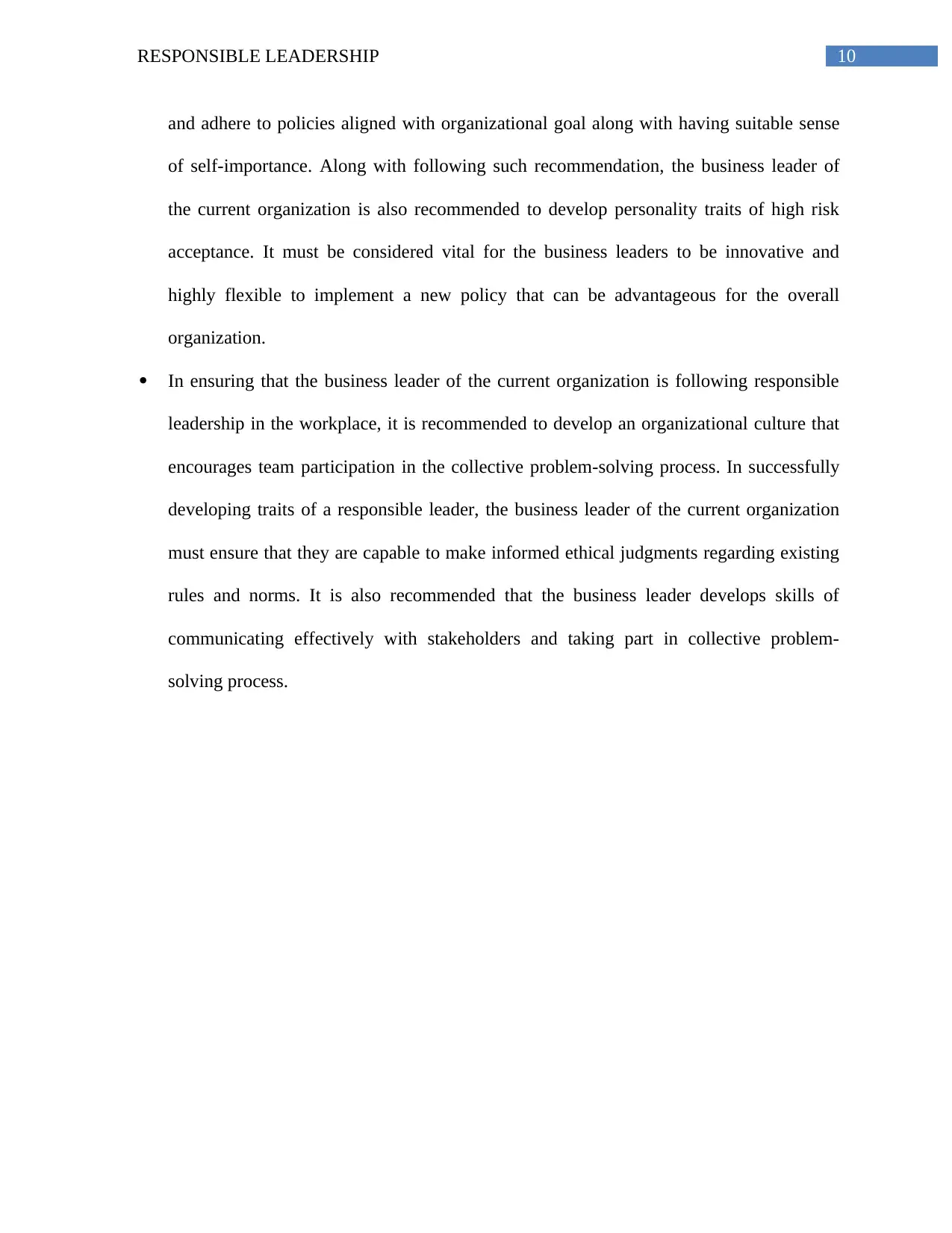
10RESPONSIBLE LEADERSHIP
and adhere to policies aligned with organizational goal along with having suitable sense
of self-importance. Along with following such recommendation, the business leader of
the current organization is also recommended to develop personality traits of high risk
acceptance. It must be considered vital for the business leaders to be innovative and
highly flexible to implement a new policy that can be advantageous for the overall
organization.
In ensuring that the business leader of the current organization is following responsible
leadership in the workplace, it is recommended to develop an organizational culture that
encourages team participation in the collective problem-solving process. In successfully
developing traits of a responsible leader, the business leader of the current organization
must ensure that they are capable to make informed ethical judgments regarding existing
rules and norms. It is also recommended that the business leader develops skills of
communicating effectively with stakeholders and taking part in collective problem-
solving process.
and adhere to policies aligned with organizational goal along with having suitable sense
of self-importance. Along with following such recommendation, the business leader of
the current organization is also recommended to develop personality traits of high risk
acceptance. It must be considered vital for the business leaders to be innovative and
highly flexible to implement a new policy that can be advantageous for the overall
organization.
In ensuring that the business leader of the current organization is following responsible
leadership in the workplace, it is recommended to develop an organizational culture that
encourages team participation in the collective problem-solving process. In successfully
developing traits of a responsible leader, the business leader of the current organization
must ensure that they are capable to make informed ethical judgments regarding existing
rules and norms. It is also recommended that the business leader develops skills of
communicating effectively with stakeholders and taking part in collective problem-
solving process.
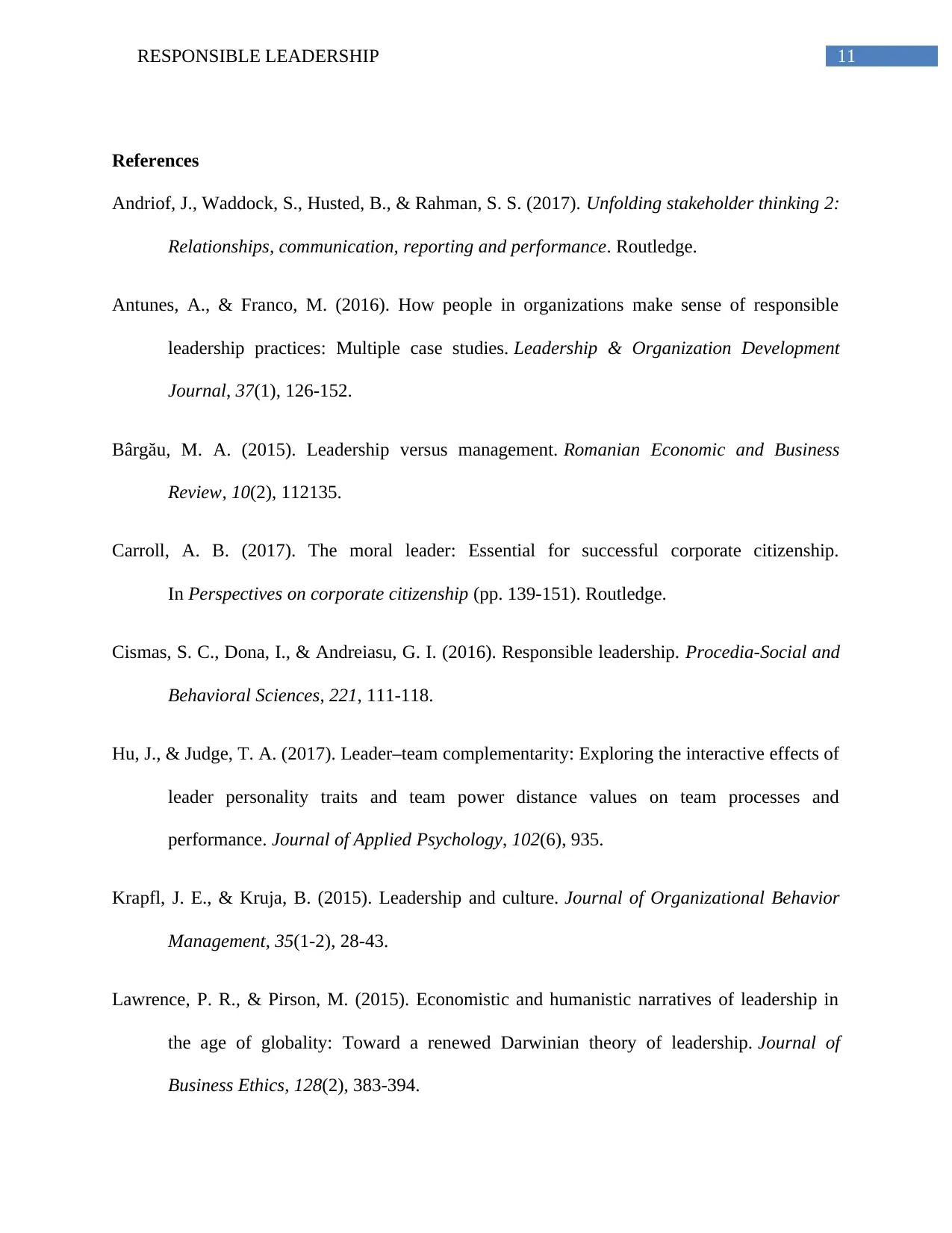
11RESPONSIBLE LEADERSHIP
References
Andriof, J., Waddock, S., Husted, B., & Rahman, S. S. (2017). Unfolding stakeholder thinking 2:
Relationships, communication, reporting and performance. Routledge.
Antunes, A., & Franco, M. (2016). How people in organizations make sense of responsible
leadership practices: Multiple case studies. Leadership & Organization Development
Journal, 37(1), 126-152.
Bârgău, M. A. (2015). Leadership versus management. Romanian Economic and Business
Review, 10(2), 112135.
Carroll, A. B. (2017). The moral leader: Essential for successful corporate citizenship.
In Perspectives on corporate citizenship (pp. 139-151). Routledge.
Cismas, S. C., Dona, I., & Andreiasu, G. I. (2016). Responsible leadership. Procedia-Social and
Behavioral Sciences, 221, 111-118.
Hu, J., & Judge, T. A. (2017). Leader–team complementarity: Exploring the interactive effects of
leader personality traits and team power distance values on team processes and
performance. Journal of Applied Psychology, 102(6), 935.
Krapfl, J. E., & Kruja, B. (2015). Leadership and culture. Journal of Organizational Behavior
Management, 35(1-2), 28-43.
Lawrence, P. R., & Pirson, M. (2015). Economistic and humanistic narratives of leadership in
the age of globality: Toward a renewed Darwinian theory of leadership. Journal of
Business Ethics, 128(2), 383-394.
References
Andriof, J., Waddock, S., Husted, B., & Rahman, S. S. (2017). Unfolding stakeholder thinking 2:
Relationships, communication, reporting and performance. Routledge.
Antunes, A., & Franco, M. (2016). How people in organizations make sense of responsible
leadership practices: Multiple case studies. Leadership & Organization Development
Journal, 37(1), 126-152.
Bârgău, M. A. (2015). Leadership versus management. Romanian Economic and Business
Review, 10(2), 112135.
Carroll, A. B. (2017). The moral leader: Essential for successful corporate citizenship.
In Perspectives on corporate citizenship (pp. 139-151). Routledge.
Cismas, S. C., Dona, I., & Andreiasu, G. I. (2016). Responsible leadership. Procedia-Social and
Behavioral Sciences, 221, 111-118.
Hu, J., & Judge, T. A. (2017). Leader–team complementarity: Exploring the interactive effects of
leader personality traits and team power distance values on team processes and
performance. Journal of Applied Psychology, 102(6), 935.
Krapfl, J. E., & Kruja, B. (2015). Leadership and culture. Journal of Organizational Behavior
Management, 35(1-2), 28-43.
Lawrence, P. R., & Pirson, M. (2015). Economistic and humanistic narratives of leadership in
the age of globality: Toward a renewed Darwinian theory of leadership. Journal of
Business Ethics, 128(2), 383-394.
⊘ This is a preview!⊘
Do you want full access?
Subscribe today to unlock all pages.

Trusted by 1+ million students worldwide
1 out of 13
Related Documents
Your All-in-One AI-Powered Toolkit for Academic Success.
+13062052269
info@desklib.com
Available 24*7 on WhatsApp / Email
![[object Object]](/_next/static/media/star-bottom.7253800d.svg)
Unlock your academic potential
Copyright © 2020–2026 A2Z Services. All Rights Reserved. Developed and managed by ZUCOL.





